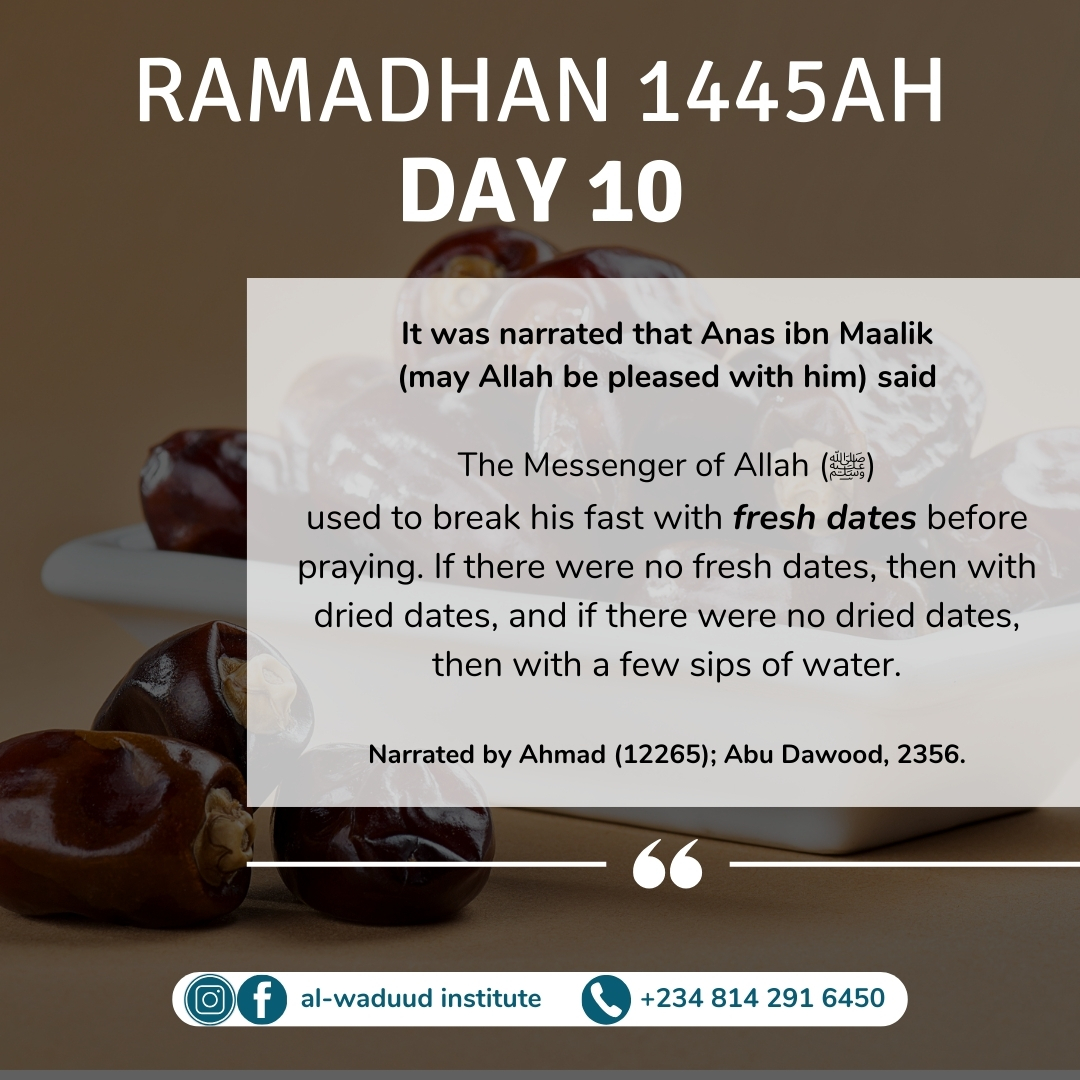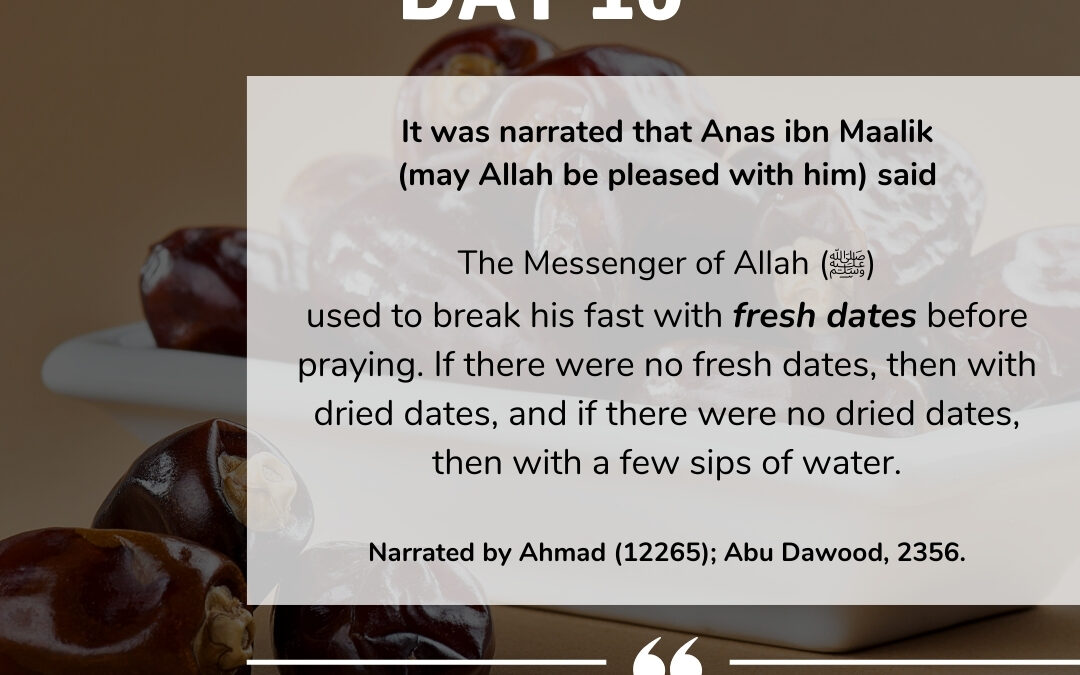It was narrated that Anas ibn Maalik (may Allah be pleased with him) said:
The Messenger of Allah (ﷺ)
used to break his fast with fresh dates before praying. If there were no fresh dates, then with dried dates, and if there were no dried dates, then with a few sips of water.
Narrated by Ahmad (12265); Abu Dawood, 2356.
This hadeeth points to some of the etiquette of breaking the fast, in which the fasting person should follow the example of the Prophet (peace and blessings of Allah be upon him), such as breaking the fast before praying Maghrib. This – and Allah knows best – clearly indicates that it is mustahabb to hasten to break the fast.
We should also break the fast with fresh dates, and if they are not available then with dried dates. If dates are not available then we should break the fast with water. In countries where dates are not easily available, people may eat some other kinds of fruit, or some sweets, instead.
It was narrated from Salmaan ibn ‘Aamir al-Dabiy that he heard that the Prophet (peace and blessings of Allah be upon him) said: “When any one of you breaks his fast, let him break his fast with dates for that is a blessing; if there are no dates then with water, for that is a means of purification.” Narrated by al-Tirmidhi, 658.
It was narrated that Anas ibn Maalik said: When the Prophet (peace and blessings of Allah be upon him) broke his fast, he would start with dates.
It was also narrated that Anas (may Allah be pleased with him) said: I never saw the Prophet (peace and blessings of Allah be upon him) pray until he had broken his fast, even if that was with a drink of water. Narrated by al-Firyaabi in al-Siyaam, 67; its isnaad is saheeh.
Limiting oneself to date and water when breaking the fast is very beneficial, because it introduces food into the stomach gradually, so that it will be prepared to receive food after that.
Ibn al-Qayyim (may Allah have mercy on him) said: The fact that the Prophet (peace and blessings of Allah be upon him) broke his fast with fresh or dried dates or water is very beneficial to the health, because fasting empties the stomach of food and there is no nourishment to be sent to the different parts of the body. Sweet foods are quickest to be absorbed and processed, especially if they are fresh, so they are more readily digested. If there are no fresh dates, then one should eat dried dates because they are sweet and nourishing. If there are no dried dates then a few sips of water will extinguish the pangs of hunger and the heat of fasting, to that the stimach will be prepared to receive food.
We should not go to extremes in preparing all kinds of food and drinks when breaking the fast. This goes against the Sunnah of the Prophet (peace and blessings of Allah be upon him), and distracts us from hastening to attend Maghrib prayer in congregation, and may lead to missing it altogether because the time for Maghrib is so short. Ibn al-‘Arabi said: The Prophet (peace and blessings of Allah be upon him) used to break his fast before praying with a small amount of food that would not distract him from the prayer. This involves three benefits: hastening to break the fast, freeing the mind to focus on the prayer, and allows for a gap between the two prayers (Maghrib and ‘Isha’).
The fasting person should not be extravagant in the food he eats at night in Ramadaan or eat too much. Ramadaan is a time for worship and obedience to Allah, not a time for fancy meals and full stomachs.
Ramadaan is an opportunity for the fasting person to learn to be economical and moderate.
Preparing a lot of different types of food distracts housewives from reading Qur’aan and remembering Allah, so that for many families Ramadaan has become a time for making all kinds of food and drink, as if they want to make up for what they have missed during the day when fasting. Nothing is more indicative of that than the fact that just before Ramadaan the stores prepare all kind of delicious and delightful food, so that Ramadaan has become a month of overindulgence when it should be a month of patience, worship and jihad. And Allah is the One Whose help we seek.
Being economical and moderate in the food prepared for dinner will make the fasting person healthy so that he will be able to pray taraaweeh and tahajjud at night in an energetic and enthusiastic manner. This is something that we can see. But filling the stomach with food means that he will need to drink, so his body will lose energy and he will feel too lazy to do acts of worship, and he will not benefit himself during the rest of the night. The fasting person should heed the words of the Prophet (peace and blessings of Allah be upon him): “The son of Adam does not fill any vessel worse than his stomach. A few mouthfuls are sufficient for the son of Adam to keep him going. But if he must (fill it) then one-third for food, one-third for drink and one-third for air.” Narrated by al-Tirmidhi, 2381.
For the fasting person gives up all the things he is used to during the day, seeking thereby the reward of Allah and to fulfil the trust of fasting which Allah has connected to Himself, which is indicative of his will power and firm resolve. So it is more befitting that at the time of breaking the fast he should not do anything to spoil that by breaking his fast with something that Allah has forbidden, thus destroying at night that which he had built up during the day and proving himself to be lacking in will power and patience.
Those who smoke or have other harmful habits should make the most of the training afforded by the month of fasting, and avoid them at night just as they avoided them during the day, so that they will be able to give them up altogether.
They should continue their resolve and determination during the night just as they did during the day, and avoid their former companions and make up for that by finding good and righteous companions. This will be a help to them, after seeking the help and support of Allah.
And Allah knows best.
See Ahaadeeth al-Siyaam by al-Fawzaan, p. 93

